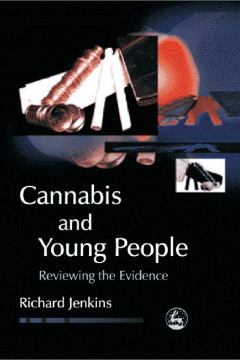
Additional Information
Book Details
Abstract
Cannabis is at the centre of ongoing controversial and often confused debate. Opinions on its potential impact on health are sharply divided: some argue that it poses serious risks to mental health and that adolescent use may lead to psychotic illness in young adulthood, or that it acts as a gateway to hard drugs such as cocaine or opiates. Conversely, others point to alcohol or tobacco being far more harmful yet entirely legal.
Cannabis and Young People aims to shed light on the current debates by reviewing all the available evidence on a range of issues relating to the use of cannabis among children and adolescents and summarizing the main conclusions in clear, jargon-free language.
Areas covered include:
* Patterns of cannabis use
* Changes in usage
* Young people's views on cannabis
* The potential harmful effects, including mental health problems, educational attainment, antisocial behaviour
* The family and social factors that can initiate cannabis use
* The progression to regular use
* The effects of decriminalization
This book will be an essential read for anyone needing informed, authoritative information about cannabis and its effects.
Provides all the vital information surrounding cannabis in one text
Youth & Policy
`This book aims to strip away the polemics and establish the facts. It provides a concise, but comprehensive literature review of cannabis and young people, including: patterns of use, young people's views, predictors of use, the effects of cannabis, links with the use of other drugs, prevention and treatment, and policy issues. The book is a useful summary and will be of interest to the professional working in the field… This book provides a good guide to the literature and research on cannabis and young people. This will be a valuable resource for anyone researching this field or with a specific interest, such as substance misuse workers in young offenders and juvenile establishments.' - Prison Service Journal
`The content is timely, readily accessible and written in plain English, appealing to profeesional and lay readers. The contextualisation of cannabis use among young people explores a complex range of social factors, notably, gender, age, ethnicity, class and anti-social behaviour… There is a helpful range of websites and literature sources.'
`The book is slim with handy summaries at the end of each chapter, the underlying message being how difficult it is to make hard and fast statements on a subject so riven with ignorance and misinformation and about which everybody seems to be desperate for easy answers and quick fixes'. - Safer Society
`Writing for mental health health professionals and parents, Jenkins (Institue of Psychiatry, London) reviews the evidence in a range of issues relating to the use, young people's views, predictors of use, psychosocial functioning , the gateway effect, prevention and treatment, and policy'. - Book News
`This small book provides a considerable amount of very useful information for those who are involved in seeking to develop programs for the prevention and treatment of cannabis use. This includes parents, teachers, therapists, the police, and many other bodies in society'.
Internet Law Books
`This is a useful introduction for any practitioner working with young people.'
Journal of Mental Health
Richard Jenkins is a researcher at the Institute of Psychiatry, London. He previously worked for FOCUS at the Royal College of Psychiatrists' Research Unit and as a systematic reviewer with the National Collaborating Centre for Mental Health. His other research interests include occupational stress and burnout among healthcare professionals.
Table of Contents
| Section Title | Page | Action | Price |
|---|---|---|---|
| Prelims (Foreword/ Preface) | |||
| Introduction: A history of Training for Transformation | |||
| Part One: Moving a mountain starts with a small stone | |||
| Part Two: Seeking the self | |||
| Part Three: Healing the wounds of war | |||
| Part Four: Listening into dialogue | |||
| Part Five: Freedom from patriarchy | |||
| Part Six: Crossing cultures, building bridges | |||
| Part Seven: Long march through the institutions | |||
| Part Eight: It doesn’t need to be like this | |||
| Back Matter (Epilogue/ Appendix/ Three poems) |
